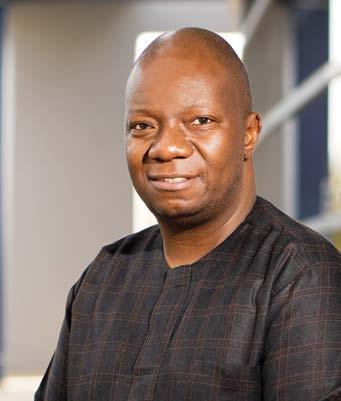
3 minute read
Scramble for Covid-19 Vaccine exposes pitfalls of Africa's pittance investment in Research and Development
Scramble for Covid-19 Vaccine exposes pitfalls of Africa’s pittance investment in Research and Development1
By McLean Sibanda, Ph.D., Managing Director Bigen Global Limited
Advertisement
Nations are built during times of crisis, when leaders and citizens come together as a common force to deal with the crisis. Increased research and development (R&D) investments by nations during times of crisis are attributable to the emergence of many technologies that shape our world today. The unprecedented impact of the COVID-19 pandemic unequivocally demonstrates Africa’s ill-preparedness and lack of capacity. The pandemic has revealed the pittance Africa invests in R&D and low supply of science, technology and innovation (STI) human capital. No COVID-19 vaccine has benefitted from R&D from Africa, embodies any intellectual property from an African country, or involves scientists from an African country. Consequently, in the scramble for COVID-19 vaccines, African countries find themselves at the bottom of the priority list. Instead of seeing this as a wakeup call to develop their own capabilities in vaccine production, African countries have resorted to lobbying the World Trade Organisation (WTO) for an intellectual property waiver for COVID-19 vaccines.
In 2019, South Africa spent 0.82% of GDP on R&D and has 432 researchers per million inhabitants. This is in contrast to China, which spends 2% on R&D and has 1089 researchers, Brazil (1.3% on R&D and 887 researchers) and Russia (1% on R&D and 3075 researchers). There is less private sector participation in South Africa compared to its BRICS peers, most of which have a COVID-19 vaccine candidate. Asian countries such as Korea and China have demonstrated the importance of R&D investment to spur innovation, increase efficiencies, create new markets and increase GDP growth. No African country has reached the 1% of GDP target agreed to by African Union Member States as a desired minimum expenditure on R&D. Increased R&D investments results in increased intellectual property output, in particular patents, which form the backbone of many of the vaccines that are entering the market today. Accordingly, it is not surprising that South Africa’s aborted first batch of COVID-19 vaccine came from the Serum Institute in India, which is manufacturing a number of vaccines under licence from various parties. Government investment in R&D is critical. The European Union and German government have invested in BioNTech, which collaborated with Pfizer on vaccine development, thus explaining why the Pfizer vaccine is cheaper in Europe than in the US.2 The UK government also invested £65.5 million funding the Oxford University/ AstraZeneca vaccine.3 South Africa, being the single largest pharmaceutical market on the African continent; coupled with the most advanced science and technology infrastructure on the continent, as evidenced by R&D inputs and outputs (research personnel per million people,4 publications and patents), has a unique opportunity to lead Africa in vaccine development and manufacturing capacity. Past investment by the South African government in biotechnology R&D, albeit small, has contributed to South African scientists having a better understanding of a more transmissible COVID-19 variant.5
South Africa should not let the current crisis go to waste. R&D investment should go hand-in-hand with building a critical mass of STI human capital. This should be coupled with strategic acquisition of foreign-owned intellectual property and capabilities as well as technology transfer, to bolster the emergence of an industry that will serve the people of Africa, if we are to learn from the Asian countries. In addition, incentives for the private sector to invest in the pharmaceutical sector and build both vaccine and therapeutic R&D and manufacturing capacity. The announcement on February 18, 2021 by President Ramaphosa that he has directed that South Africa assemble a team of scientists to build vaccine development and manufacturing capability for future pandemics is encouraging6 but requires deliberate increased R&D investment.7
1. By McLean Sibanda, Ph.D., Managing Director Bigen Global Limited, is a published Author of the book Buts & Bolts – Strengthening Africa’s Innovation and Entrepreneurship Ecosystem, and an innovation expert that has worked throughout the country and has advised SADC, AU, various governments (Eswatini, South Africa, and Tanzania).
2. https://www.internationalhealthpolicies.org/featured-article/why-does-pfizer-deny-the-public-investmentin-its-covid-19-vaccine/
3. https://www.ox.ac.uk/news/2020-05-18-funding-and-manufacturing-boost-uk-vaccine-programme
4. https://www.indexmundi.com/facts/indicators/SP.POP.SCIE.RD.P6/map/africa
5. https://www.moneyweb.co.za/news/south-africa/south-african-scientists-who-discovered-new-covid19-variant-share-what-they-know/
6. https://ewn.co.za/2021/02/18/sa-must-develop-its-own-vaccines-says-president-ramaphosa 7. https://www.dst.gov.za/index.php/media-room/latest-news/3285-investment-in-r-d-declines-but-vitalin-the-era-of-covid-19










